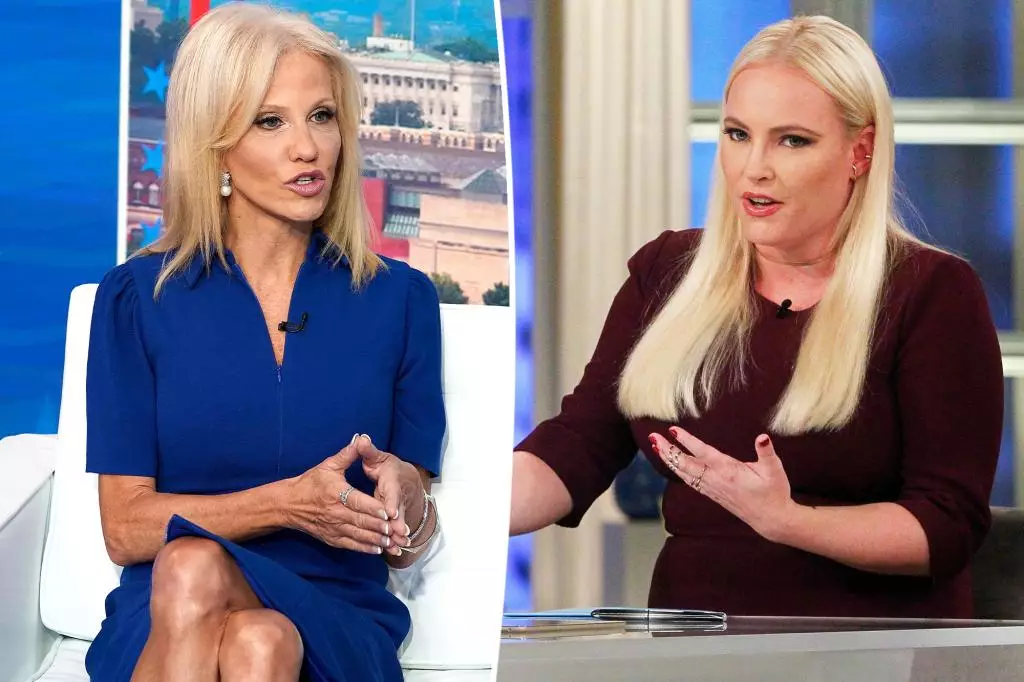The confrontation between Kellyanne Conway and Meghan McCain serves as a vivid illustration of the high-stakes interpersonal dynamics in the world of political commentary and public discourse. Reportedly occurring backstage at a panel hosted by the Washington Post, this incident unfolded under the scrutiny of an intrigued audience. As details of the exchange emerged, they painted a picture that reflects not just personal grievances, but the broader yet often thorny tensions that arise in the intersection of personal lives and public personae.
At the heart of this incident lies a history of public statements that have undoubtedly colored the perspectives of both women involved. Meghan McCain, a prominent conservative commentator, has openly criticized Conway, particularly in light of her marriage to George Conway, a co-founder of the Lincoln Project, an organization known for its opposition to Donald Trump. McCain’s description of this relationship as “gross” has animated discussions around loyalty, betrayal, and the portrayal of personal lives in the often brutal arena of political commentary.
Following a panel discussion that included both Conway and McCain, the green room became the backdrop for a verbal altercation that, depending on the witness, was characterized either by fury or by a surprising calm. Some claimed that Conway aggressively confronted McCain, accusing her of being “disgusting” and “hurting people.” Others, however, present a much more muted version of the encounter, suggesting that Conway sought to express her discontent in a composed manner, citing her feelings candidly without raising her voice.
The diverging accounts of the encounter underscore a key aspect of interpersonal conflicts—perception versus intention. This disparity invites readers to consider how personal biases shape individual interpretations of a shared experience. McCain’s repeated pleas of discomfort—in which she noted, “You’re in my space. I’m uncomfortable”—indicate a desire to disengage from an emotionally charged confrontation. Her statements might echo a broader sentiment among professionals navigating the often tumultuous intersections of personal discomfort and professional engagement.
Importantly, this altercation also acts as a magnifying glass to examine how public figures handle personal trauma in the context of their professional identities. McCain’s reference to Donald Trump’s controversial comments about her late father, Senator John McCain, suggests an ongoing struggle with public perceptions and personal pain. This mention highlights the considerable emotional weight that past political interactions often bear on current relationships between public figures.
What comes after such confrontations is equally revealing. The public reaction shall delve into the audiences’ views of both Conway and McCain, framing them through the lens of the altercation. Conway’s insistence that she remained composed suggests her aim to uphold an image of professionalism, while contrasting accounts from witnesses challenge that assertion. It raises questions about authenticity in political discourse and whether personal grievances should have any place in public discussions.
Moreover, the incident highlights an essential truth about the nature of celebrity in political circles. Both women are not only public commentators but also individuals entwined in prevailing political narratives. Their experiences serve as case studies of how personal conflicts can impact public perception and may, in turn, shape broader discourse within the media and their respective political factions.
The altercation between Kellyanne Conway and Meghan McCain provides a provocative case study in the entanglements of personal and public life for figures embroiled in America’s polarized political landscape. Their encounter serves as a reminder of the emotional complexities inherent in political commentary and public engagement. In the end, beyond the local drama, this jagged episode exemplifies the unfolding of individual narratives within the larger tapestry of contemporary political conflict, hinting at the emotional legacies that persist even as public figures attempt to navigate their professional lives.

